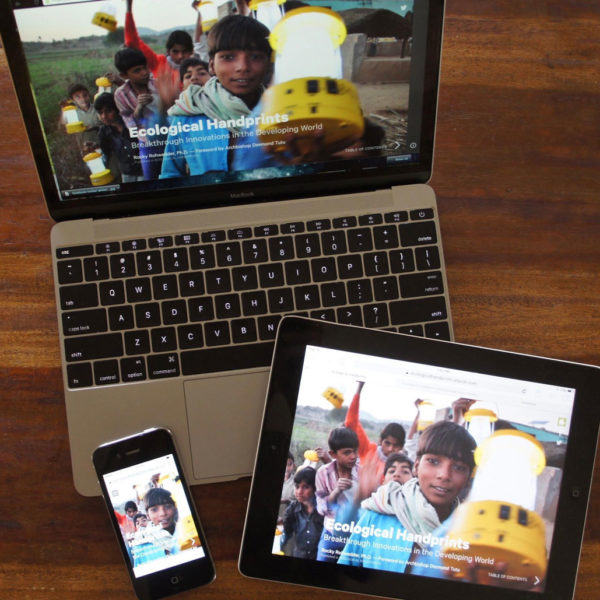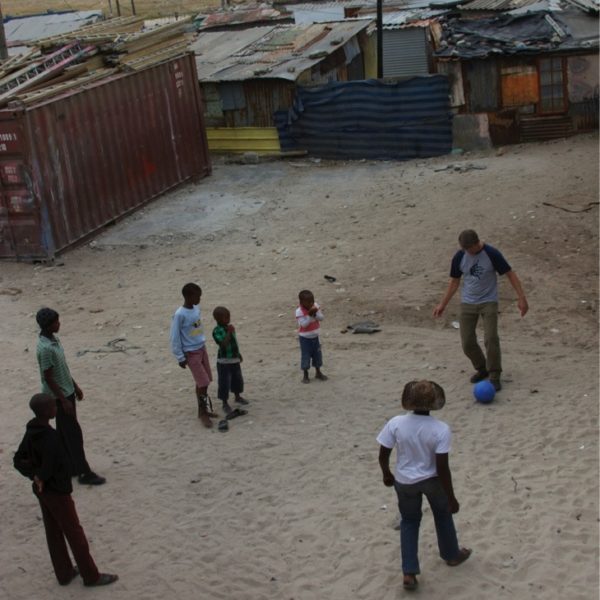
We need to promote development that does not destroy our environment.
Wangari Maathai, Nobel Peace Prize Laureate
About Ecological Handprints
We are living in an era that Dutch chemist Paul Crutzen has labeled the “Anthropocene” — a new geologic epoch defined by our own massive impact on the planet. The path of the Anthropocene has been paved in large part by resource-intensive, fossil fuel-dominated, and highly polluting patterns of consumption. It has risen steeply and rapidly from the time of the industrial revolution to the present day, at least for those in highly developed economies. Today, however, this old path — based on false assumptions of cheap energy and unlimited nature — ultimately leads us all to a dead end of greater human suffering and conflict, along with further weakening and depletion of the natural systems that support all life on the planet.
Now we face the daunting task of successfully navigating the rest of the Anthropocene. The journey will require a fresh perspective, with a high level of innovation, commitment and creativity. In the days ahead, as billions continue struggling to meet basic human needs, we must look beyond merely lowering our Ecological Footprint to create a richer, deeper, and more relevant paradigm that brings people not only closer to the planet, but also closer to each other.
The Ecological Footprint has justifiably emerged as a premier measure of humanity’s demand on nature and a leading indicator in the field of sustainability. Nevertheless, the Footprint is a limited accounting tool. It only quantifies our impact on natural systems and natural capital. It is not designed to encompass or measure our related impact on human development or humanitarian issues such as poverty, human rights, and social justice. In other words, while the concept of Ecological Footprints is a key piece of the equation, it’s missing an important component – the human touch.
Ecological Handprints expands upon the Ecological Footprint by linking together the interrelated goals of sustaining the biological integrity of the planet and ensuring sustenance for those in need. The interrelationship between these two goals is crucial, but is often overlooked when we focus on solving one issue or the other.
As we seek creative responses to a more complex and compromised planetary village, Ecological Handprints represent a nexus-based approach to problem solving in the challenging days ahead — an approach built on a wide range of innovative efforts that improve human well-being while also having a low-footprint.
Ecological Handprints Resources
In addition to our social media pages (KEEP IN TOUCH links at the bottom), here are some outstanding resources (programs and publications) in support of Ecological Handprints.
Sustainable Development Goals Good Practices (First Edition, December 2020) The publication presents 16 SDG Good Practices from across the globe, received in response to the first open call for good practices, success stories and lessons learned in SDG implementation, promoted by UN DESA between 2018 and 2019.
Sorted by geographical region, this publication describes the diverse examples in detail, featuring updates and reflections on the impact and adaptations to the COVID-19 pandemic and showcasing results and impact.
Sustainable Energy for All Sustainable Energy for All (SEforALL) is an international organization that works in partnership with the United Nations and leaders in government, the private sector, financial institutions, civil society and philanthropies to drive faster action towards the achievement of Sustainable Development Goal 7 (SDG7).
Project Drawdown Project Drawdown is a nonprofit organization that seeks to help the world reach “Drawdown”— the future point in time when levels of greenhouse gases in the atmosphere stop climbing and start to steadily decline. They conduct assessments of climate solutions and publish a table of solutions.
UNDP-UNEP Poverty-Environment Initiative The Poverty-Environment Initiative (PEI) of the United Nations Development Program (UNDP) and the United Nations Environment Program (UNEP) is a global program supporting country-led efforts to put pro-poor, pro-environment objectives into the heart of government by mainstreaming poverty-environment objectives into national development and sub-national development planning, from policymaking to budgeting, implementation and monitoring.
The Equator Initiative This initiative of the United Nations Development Program (UNDP) brings together a wide range of governmental and non-governmental organizations to advance local sustainable development solutions for people, nature and resilient communities. The Initiative seeks to recognize the success of local and indigenous initiatives, create platforms to share knowledge and good practice, inform policy to foster an enabling environment for local and indigenous community action, and develop the capacity of local and indigenous initiatives to scale-up their impact. Their annual award winners (10 each year) always include wonderful examples of Ecological Handprints. They also maintain a powerful case study database.
Power for All Power for All is a collective of public and private organizations dedicated to delivering universal energy access before 2030. They advance renewable, decentralized electrification solutions to support cost-effective and sustainable approaches to universal energy access.
Ashoka Changemakers Ashoka, innovators for the public, has established programs in over 60 countries and supports the work of nearly 3000 Fellows. Ashoka is founded on the premise that the most effective way to promote positive social change is to invest in social entrepreneurs with innovative solutions that are sustainable and replicable, both nationally and globally.
International Institute for Sustainable Development (IISD) IISD is a Canadian-based, international public policy research institute for sustainable development. IISD has chosen to focus on topics that are ripe for transformation—where a shift in policy has the potential to snowball and, before too long, to change the nature of the game. They translate research insight into practical, realistic and cost-effective policy options.
Centre for Science and Environment Based in New Delhi and one of India’s leading NGOs, this group has a long-standing tradition of focusing on ecological, low-cost means for increasing human well-being. The Centre offers a range of valuable publications as well as services in the five program areas of communication, research, education and training, digital and print knowledge portal, and pollution monitoring.
Echoing Green In support of the social entrepreneur movement, Echoing Green has provided more than 500 emerging social entrepreneurs working in more than forty countries with over $30 million in start-up funding, customized support services, and access to their global network of champions. After completion of their Fellowship, Echoing Green-funded organizations raise, on average, thirty-seven times their Echoing Green seed investment and two out of three reach sustainability.


